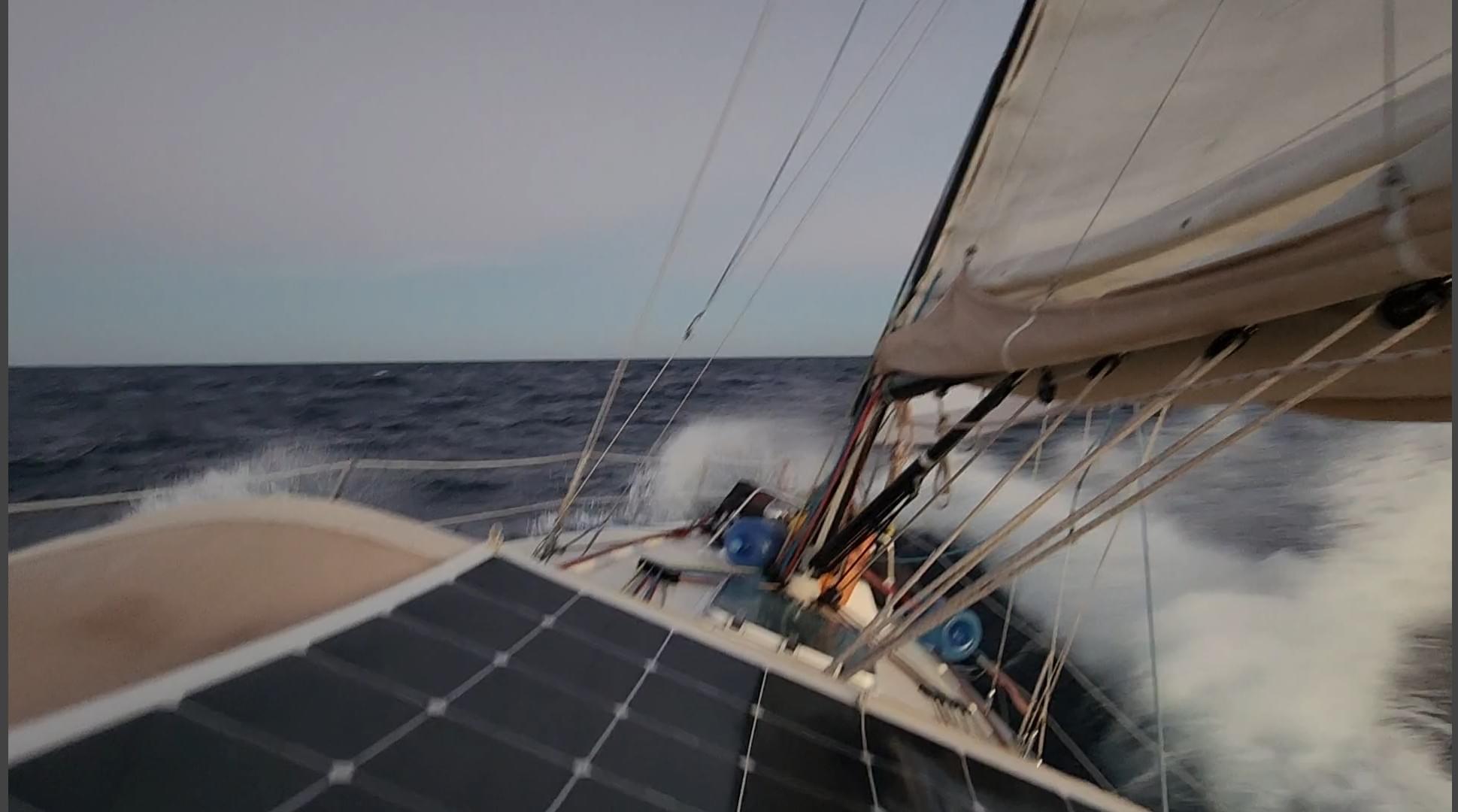Day 4 - Sunday, October 2nd
The morning of day 4 (day 4!!!) is beautiful. Yalçın is catching up on sleep below. I opened a few windows for some air flow inside. I watch Monsieur Engine's vitals (temperature, oil pressure, rpms...) carefully, he's gonna have to run strong for the next 7 hours to cover the 35 nautical miles that separate us from the Northern tip of Colombia. I got back and forth many times: dishes, eating the rest of my potato salad, boiling eggs, then pasta, charging my phone, filming the beautiful landscape of this arid point beaten by Caribbean trade winds and, of course, checking Navionics periodically on our path. The peninsula is busier than I originally thought, with the next little bay being a containership port with countless cargo ships moored or anchored outside its entrance appearing on AIS.
From 5:30 to 7 AM, I enjoyed myself, and the lovely scenery, knowing that once we are in the trades, it may not be as pleasant. Flying fish are graciously emerging from the surface and flying for an amazingly long distance, alone or in small groups. Wavelets, of current maybe, tickle Tirb on his port side, before swallowing his hull altogether. We are making good progress at more than 5 knots.
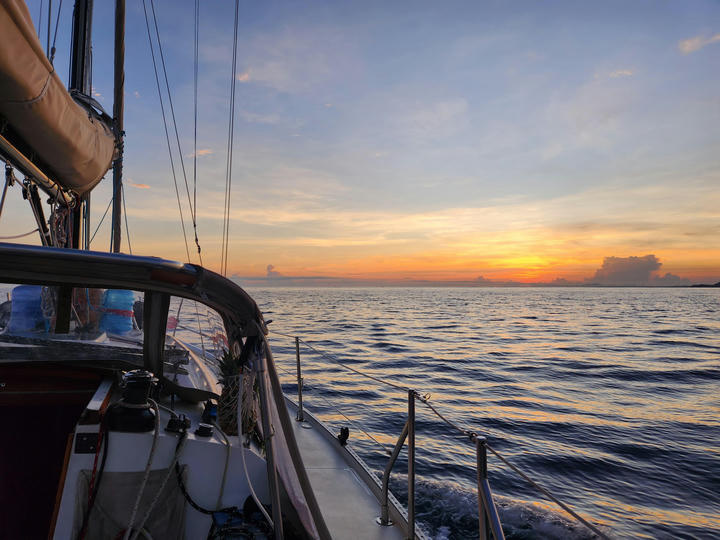
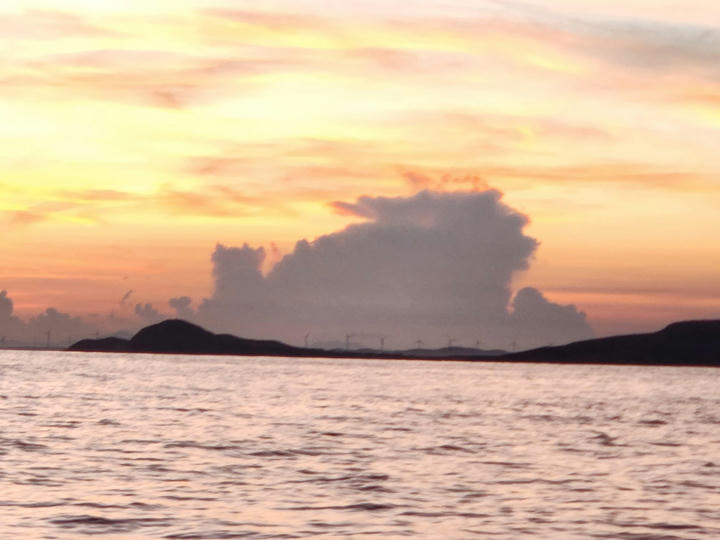
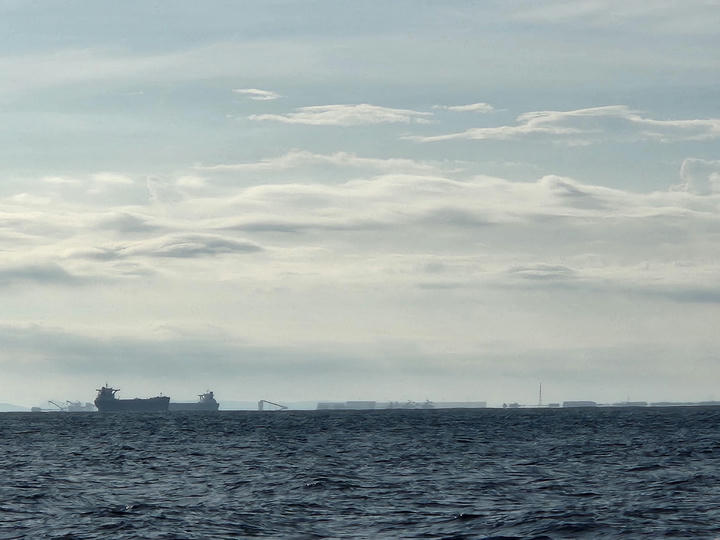
At 7, Yalçın wakes up rested. We spend a little time together, confirming our plan and discussing what needs to be done this morning: a Turkish eggplant dish on the galley side and putting away the spinnaker on the cabin side. We start seeing fishermen pangas here and there setting up nets - possibly the people we heard go out from the anchorage. Always a rush of adrenaline, but they wave at us in a friendly way. It does mean careful attention to the course as they are setting up fish traps marked by little flag poles all around. We must avoid them, a lesson we learned years earlier with Avocet, Yalçın's old boat after which the hydrovane is named. Since Yalçın seems ready to take over, my body sends signals that there is an opportunity to rest and it would be dumb to pass on it. Sleeping in these calm conditions is a luxury and I pass out in the carré for 3 hours while Yalçın and Monsieur hammer along the coast keeping up a good speed.
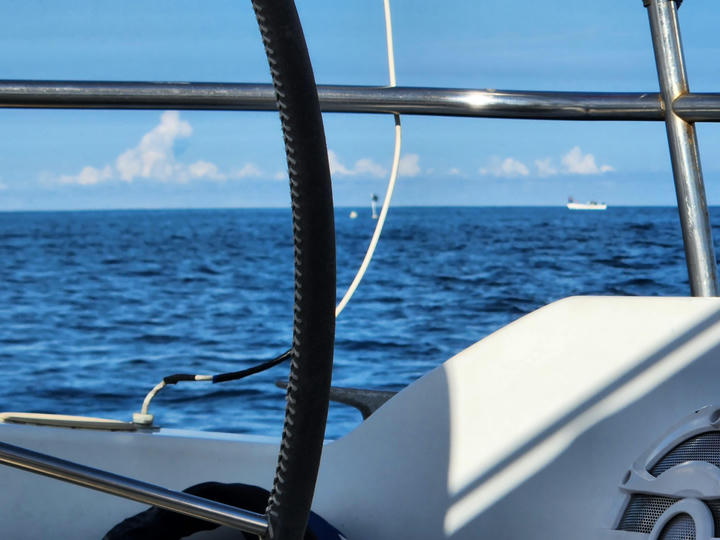
When I emerged at 10, it was hot and I felt too lazy to go out. Yalçın announced that one of the pins we use to set the bimini had fallen overboard. A bummer! They are so handy. But it had to happen someday I guess... In a grove, Yalçın finds a replacement instantaneously. When I emerge into the cockpit, finally full of energy, I'm amazed by the fix, it's as good as the original! Look on the other side, Yalçın says. I look and start laughing uncontrollably... Indeed, an inch (3 cm) sticks out on the other side!! Almost perfect! But anyhow, it does the job which is the important thing for now (and very likely for longer...).
At around noon, the wind has picked up enough that we can sail. Let's get going! We send the full rig up! I'm not mentally quite ready enough as I used my last minutes writing the beginning of this blog post to have a faithful memory of what it was like. Spoiler: I'm not going to write anymore for the rest of the passage.
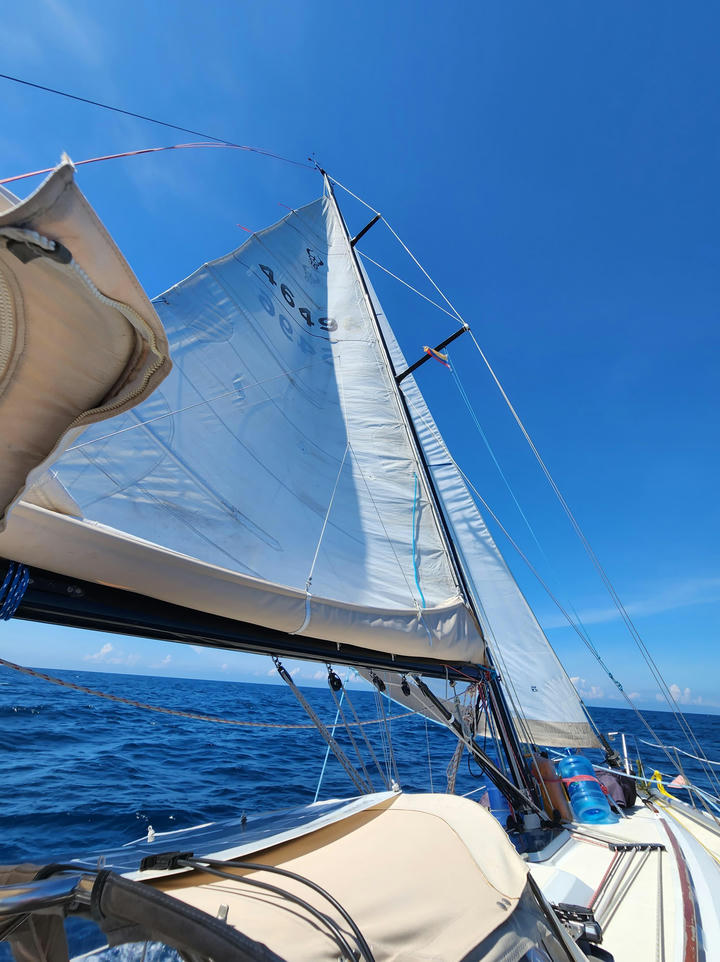
The tactical thinking has to begin and Yalçın has been on it since we have had the forecast. The main issues that lie ahead of us are (1) a rather strong west-setting current, reaching more than a knot at times - understand against us - and (2) winds in our nose - against us again. Add to that the fact that we didn't want to come anywhere close to Venezuela after seeing a video of people getting sort of harassed by the coast guards, the situation was pretty much constrained. We decided to tack back and forth close to the coast (still in Colombia) for a bit and as soon as it seemed we could make a waypoint that was supposed to be reasonably outside the current in the North, we'd go for it and aim offshore.
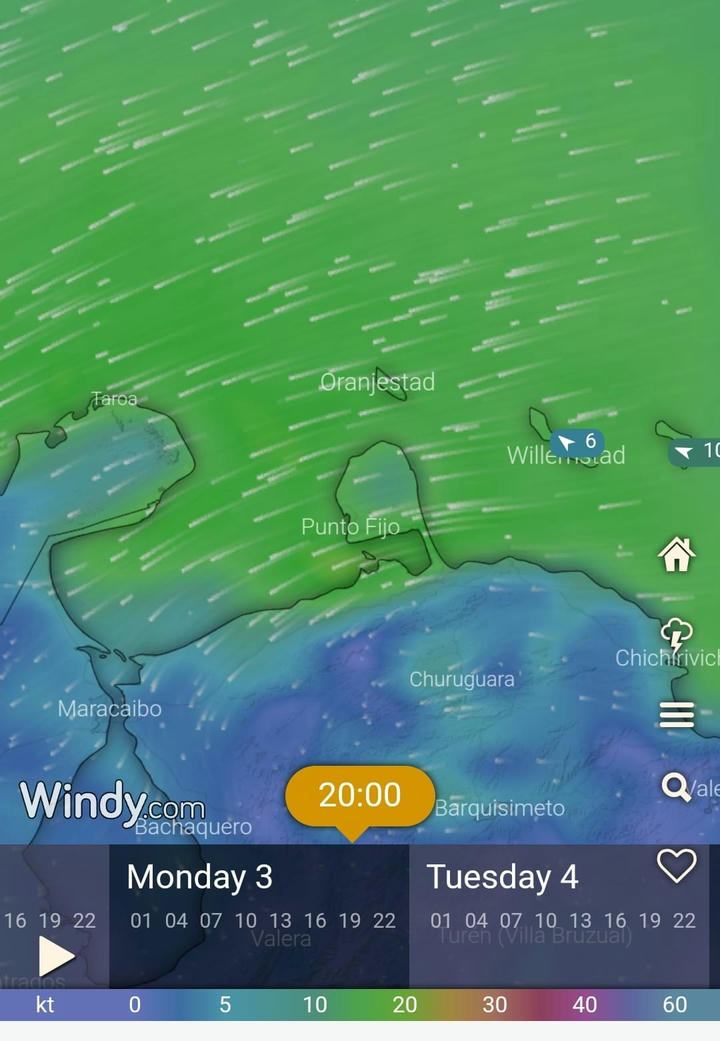
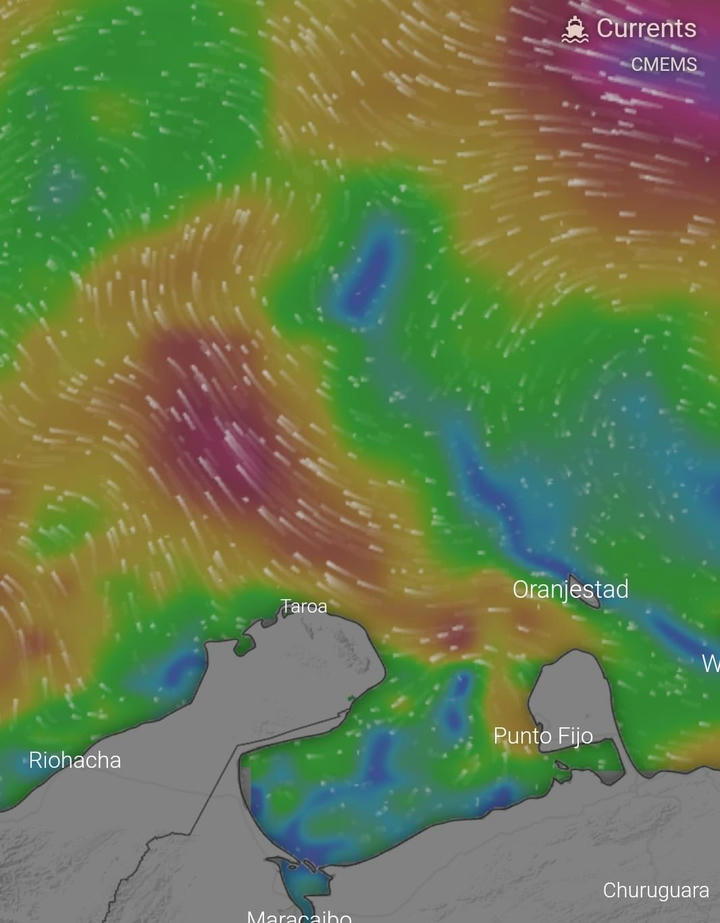
At 12:30, we tacked for the first time to end up on port. We soon took a reef in the main and were still averaging 4.5 knots with a course over ground (COG) of 120° up to 135°. An hour later we tacked for a second time and reefed the jib. Still averaging 5 knots, COG 40°. Since the angle looked good, we decided to go for our imaginary waypoint and get offshore in the current.
As the wind started to intensify and the boat heeled over more and more, Yalçın noticed that one of the shrouds seemed looser than the others. We were particularly attentive to this sort of details as we had tuned the rig underway ourselves before leaving Colombia. There was no reason for this shroud to be loose earlier than his fellow shrouds. Yalçın got worried: maybe part of the attachment had failed, which would lead the shroud to extend and could explain why it'd be loose. We had also checked the rig before leaving as beating up is extra stress on it and you want to get ahead of any breakage at sea. There was a crack in the backing plates holding some shrouds. We had consulted with the rigger who installed our new rig back in Berkeley, sending him photos, and his verdict had been: 'not necessarily a big deal, keep an eye on it and see how it evolves'. We trust the guy, but since the shroud was loose, maybe we needed to give it a look. Yalçın offered to climb up to the first spreader level to inspect the loose shroud attachment. I was not pumped, totally imagining I could have made a mistake counting turns while tuning the rig, causing the loose shroud. Or even without that, you sometimes need to add or subtract a fraction of a turn to be able to refit the locking cotter pin. Yet, I knew Yalçın wouldn't stop worrying until he got up there to check and we had miles to go. Let's make sure. The first spreader isn't that far up anyway!
That's how I ended up hoisting Yalçın up the mast offshore Colombia underway. No photos despite the success as we were both a little nervous and focused on the maneuver. Nothing looked wrong, except that we didn't know what to do with the loose shroud then. To tension it kinda of randomly or not to tension it? The mast looked centered and straight when we checked last time. The conditions, heat and stress started to get at us, so we did nothing. I was getting extremely hot as the bimini (which provides most of the shade in the afternoon) was out of the picture because of the wind, so I decided to jump in the water to cool off. Yalçın slowed down the boat, we tossed a line and I tossed myself and floated at the back of the boat in the open sea for a brief moment. The water was a shade of deep blue and I could see the waves travel towards me and then keep going fast towards a distant shore. Some of them would excite Tire Bouchon and its reverse transom would flap for a bit. The moment was a refreshment but not totally relaxing: the waves, the rush to come back to the safety of the cockpit and the forward miles to make as slowing down was giving more time for the current to set us back.
I had enough time to dry myself that it was already time to think about food before sunset. I wasn't really hungry, probably a beginning of seasickness. Yalçın was anxious too and we got in each other's way, something that never happens at sea. We ended up not eating anything and realizing that the meals we had prepared in the morning were a bit too optimistic - indeed, we had nice flat conditions for the first three days which allowed us to eat sophisticated food, but that wasn't going to be the case anymore. Why hadn't we prepared sandwiches and cut fruits or already premixed pasta salad, instead of just pasta waiting for their sauce or eggplant and meat?
After an afternoon of intensifying winds, the sun set with the promise of an uncomfortable night making good speed against the current and the wind. As Yalçın was handling all the navigation, sail setting and hydrovane course, I was wondering how I could take my night shift as anxiety was gaining on me. All the noises of the boat were paralyzing me: the flapping of the partially furled jib when a wave was setting the hydrovane off course, the creaking inside and the fresh water in the tanks making a loud bang at every wave, the slamming of the boat down the chops... How would I be able to tell if anything went wrong on my own when I was barely able to take care of myself in such conditions?
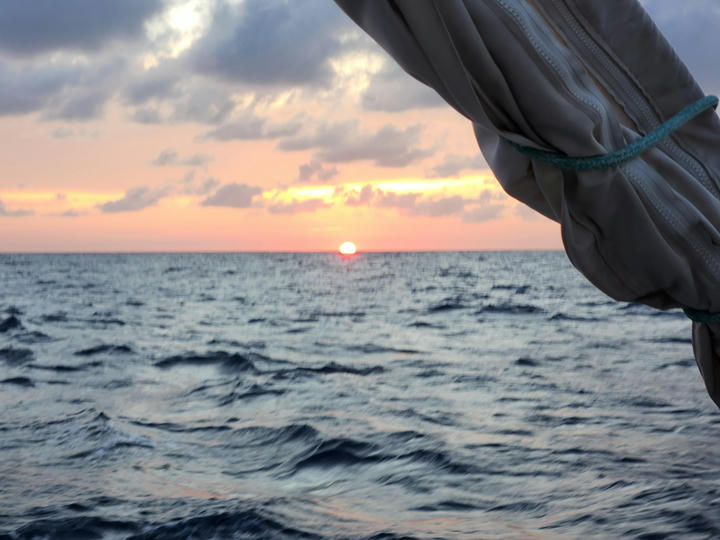

I took the first sleeping shift. Tried to sleep inside, too loud. Outside, better but still no sleep. Later at night, came my most dreaded time: Yalçın who had been sitting by the helm and caring for the boat, setting it for hours like a rock wanted, to sleep. Needed to sleep. I felt unable to do anything (including sleeping), I needed to manage at least that, offering him a chance to rest and to keep being operational. Why did we have to do that? To be here, slamming in the waves? How did we end up here?
I took the helm briefly as we reefed more for the night and tacked inshore (we had been going offshore on the same tack for more or less 9 hours). It felt surprisingly good. From my steering spot standing on top of the driver's seat, Tire Bouchon felt just like a dinghy in the South Basin of the San Francisco Bay. I know how to sail dinghies, fiercely. Yet, panic ceased in my guts when Yalçın went down. That wasn't going to fly to remain on the leeward cushion lying down. Instead of setting up 10-minute alarms to wake up and look around for other ships, I soon found myself singing in the lookout position. Singing was calming and regulating my breath, and looking was focusing my attention and allowing me to anticipate the uncomfortable motion of the boat. The hour Yalçın had given himself eventually passed, and lightning, lightning on top of everything (we had so hoped that the tradewinds would take that part away), was starting to brew right where we were going. We decided to tack, or more exactly, I informed Yalçın and he settled my inner debate (he had the big picture of the course) and we tacked. Since everything was fine after that, he went back to sleep. I stood up a little longer but the motion was tiring my legs. Tacking had solved the immediate lightning problem, and probably taken us away from the most active cloud of the night, but the trade was still spreading low dark clouds which looked quite suspicious. Quite a bunch lit up after passing us. It wasn't the best idea to be standing up with my head under the end of a metal bar (the boom) and holding another metal bar (the dodger) as we were passing under them. As we approached, I lay down on the cushion, looking at the diminishing part of the sky that had stars, hoping for a shooting star for good luck, and waiting out for the cloud to pass and the stars to reappear. One more hour passed playing this rather nerve-wracking game, helped by the deep voice of Grand Corps Malade. I think after that, Yalçın felt sufficiently rested to take over. I swear I could sleep but as I went down it turned out I couldn't. Food wasn't happening either and for 24 hours, neither of us ate anything. Water, which was the last thing I was able to monitor, felt feeding enough.
Day 5 - Monday, October 3rd
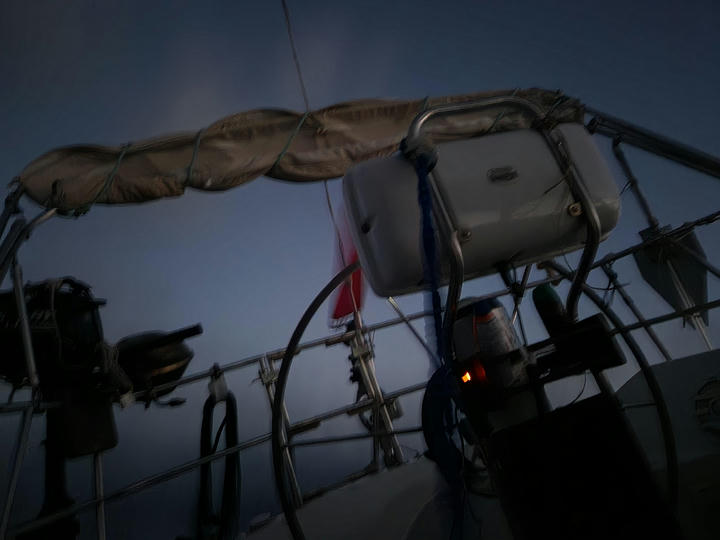
Eventually, the sun rose and the clouds disappeared. I had alternated a few more shifts. That was a relief, as Yalçın announced we would make it early next night when the moon was still up. At around 3 AM, I had the feeling we would be good tacking back inshore (we had tack again in between) and making Aruba, especially as we were expecting a lift in the afternoon. Yet, the course wasn't good and we tacked offshore again at around 8 AM for 3 hours or so. If my mood had been better, and I was able to sleep a bit outside in the morning, Yalçın's mood had deteriorated. His turn to question everything and to feel the urge to arrive. We had done an extra-tack as he wasn't that comfortable getting more and more offshore. Same, the sounds, the slamming...
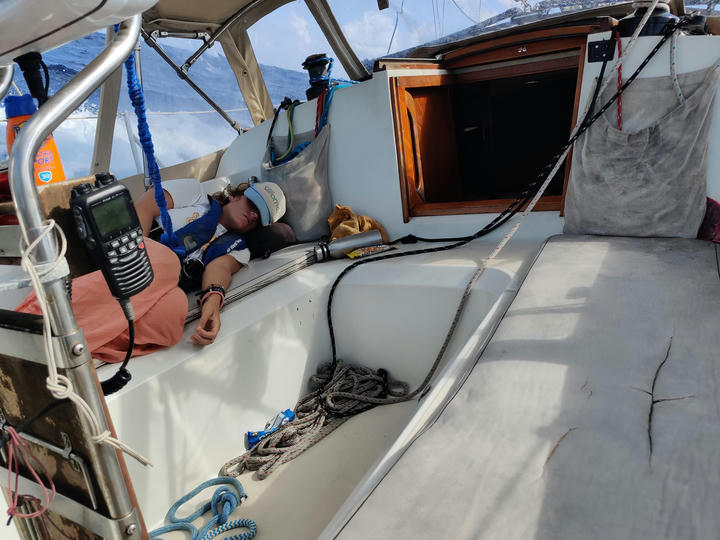
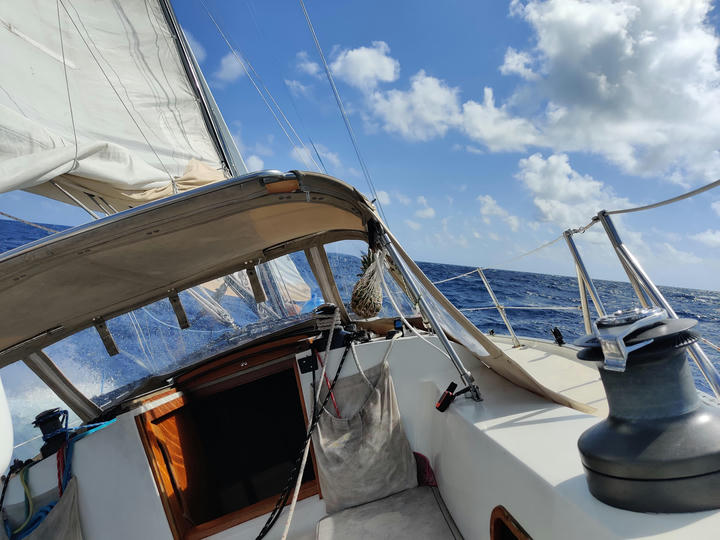
After we both rested, we started to tackle the food problem. None of us felt like reaching the fridge and warming up anything, so we went for nuts in the snack bag (we still had that!). I was lying down in the beam direction under the dodger trying to escape the sun, and Yalçın was sitting on the high side by the wheel, I finally felt we were getting a bit of comfort at last, when it happened.
Just another loud sound. But none of the usual. Yalçın spotted it instantaneously, I popped up to look but couldn't. The furling line that was holding the jib partially furled had broken. The jib was now fully unfurled and flapping more as it was not trimmed enough anymore. Yalçın trimmed it, we heeled more. We were overpowered, but the feeling wasn't much worse than right before. Yalçın was faster to reach. 'Maybe we get the jib down?'. I said nothing ('no way to make upwind progress without the head sail'). 'Or we douse the main and go jib only'. Still no sound on my end, as if talking might be painful. I was thinking, slow thinking, evaluating. 'Not sure how the boat would point (into the wind) jib only, not super pumped to try out new stuff now'. Yalçın came up with a third solution, 'we cleat the furling line (at the bow)'. It clicked, no doubt that this was the way to go! But first, we needed to investigate whether the line had broken and if it was even possible...
I went to the bow first. It was wet. At that stage, waves were often crashing over the deck into the dodger. There was enough line left to use there. 'Okay to cleat but not sure I'm strong enough'. Yalçın signaled to me that we should switch. I came back, he went at the bow and I took the helm. We furled the jib entirely, to put it on the cleat and reopened it partially. We used this opportunity to reduce its area compared to before, something I had secretly wished for, without really having the energy to do it. This broken jib line was sort of a relief for me. I spent the whole night hearing breakage in the equipment with every sound, it almost felt surreal that nothing had broken earlier. Now, something gave, we know what it is and all things considered, it's really not that bad. Less comfortable, but really, we aren't in a way worse situation.
Later, I managed to convince myself to make instant noodles. Yalçın is downstairs. If he starts boiling water, I'll take care of the rest. A huge improvement on my side, as Yalçın has been the one taking care of filling our water bottles as needed - I wasn't going down unnecessarily.
The water is boiling, no going out, I go in. Time to inaugurate our brand new boxes chosen for their perfect size to prepare instant noodles and have them underway. One of the boxes is dirty, I even dish-clean it - a little endeavor as we discovered a pipe linked to the seawater pump, below the waterline, was leaking. That meant an additional tru-hull to open and close. Eventually, both pastas are out and ready. Eating seems like a distant wish after spending that much time inside (probably 5-10 minutes, everything is relative!). Yalçın has his pasta as I sit on the high side looking at the sea with the wind on my face - it definitely helps!
The problem by then is the same as yesterday: no more shade in the cockpit! We try the bimini, as I know it is always good to push for it. As we deploy it, it does appear like a bad idea right away. Too much wind: between 20 and 25 knots apparent. New retreat under the non-shading dodger. Yalçın gets me his towel to hang from the bar and protect at least my face. I sunscreen everything that is uncovered by cloth and hope for the best. Sometime later, I'm able to eat my instant noodles, which are now at the perfect temperature for me (on the cool side). It isn't pretty! When I start, I can't stop eating, spoonful (or forkful?) after spoonful. Remember, it's been 24 hours except for the nuts and maybe a hard-boiled egg (not quite sure).
We take turns sleeping. I finally go in, it's a little flatter and some of the things start to make sense. A big wave makes a waterfall through the leeward vent as probably the two holes (supposed to drain the water away from the cabin in normal conditions) may now be aligned. That explains the water on the floor. The fruit and veggie net has been banging violently against the window, making a powder of potatoes. Luckily, even though it's almost the same color, it's not the wood holding the chain plate decomposing. The creaking is the jib car and it's probably fine. The loudest bangs (still hard to hear) are the fresh water in the tanks, especially the one at the front. It helps, but still no sleep, mostly finishing my book, a well-arranged letter communication between two characters by Virginie Despentes.
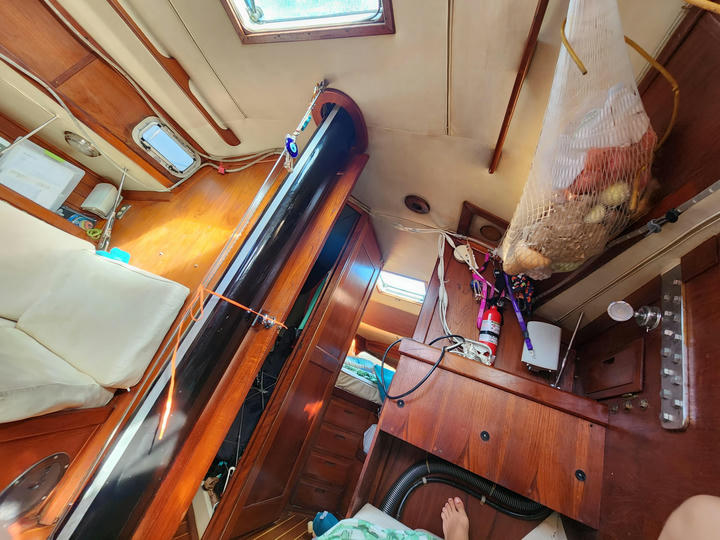
A few hours later, the sun sets. It's epic in a way no picture can convey. At least, we get this for being out there and getting our asses kicked! Our lift eventually came in the afternoon as can be seen on our GPS track. Yet, we are still not going to make it to the island. Looking back, we have been too impatient. At first, on the coast of Colombia, we could have beaten up along the coast for longer which would have helped us cross the current zone more East, where the current was weaker. Taking back down towards Aruba again, we had done it a little too early, giving a little too much credit to this lift. But it doesn't matter at this point: the plan is to get as close as possible to the island on this tack and then motor the rest. We have found an anchorage on the North of the island that's going to be perfect for resting and repairing the furling line - planning for a day and two nights - before continuing to Curaçao, the destination on our Zarpe.
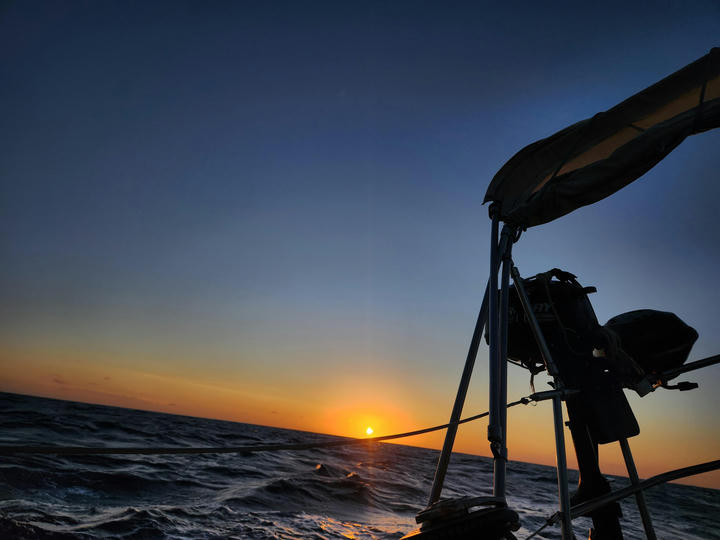
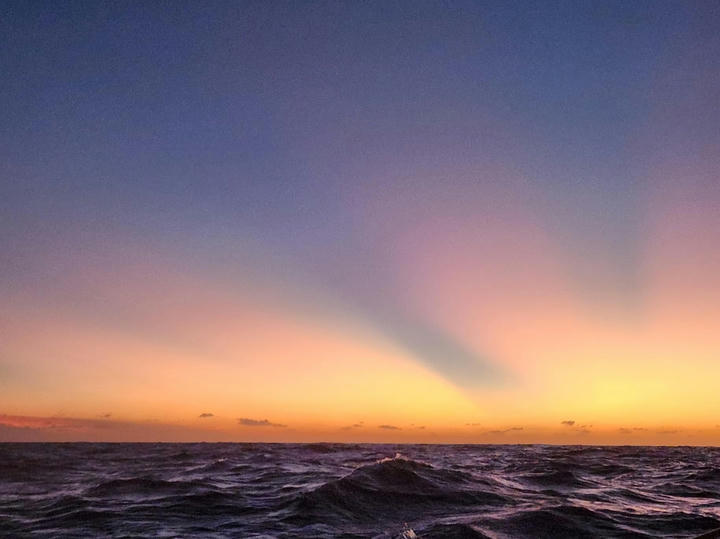
The arrival
A few ships are visible in the night as we are approaching back to civilization. Most of them are on the AIS. We think we see the lighthouse of Aruba but it'd turn out to be an offshore platform that is pretty light. A halo of human lights gets stronger and stronger in the distance, we wonder if it's Oranjestad or the Venezuelan peninsula nearby. We are still on our toes.
In the hope of making our arrival more real, Yalçın wants to give all he has for the last hours and push through his fatigue. I remind him that you never know what's to come and that pushing through may not be the best option. That's probably why, he goes to sleep for a few hours early that night. My anxiety comes back but it's not as bad. We are surrounded by ships and closer and closer to our destination. Sadly, we are really going parallel to it and another counter current seems to be slowing us down again. Frustrating. We fire up the engine when within 8 miles, after trying for a tack (but the angle was too too bad) and start motoring against the wind. It's slow but to the point. Yalçın goes back to sleep. I remember how late he woke me up when we were arriving to the anchorage in Cabo de la Vela. I try to do my best to imitate. I study the anchorage on Navionics, it seems busy or complicated for an arrival at night. It's large though. I mark places that seem away from any danger and set the autopilot. We have turned our nav lights back on - something we haven't bothered with while offshore.
I eventually wake Yalçın up. We are getting closer. We decide to douse the main. Yalçın goes to the mast while I steer. We are visible. I ask Yalçın to take our powerful spotlight and shine light ahead of us. Who knows if there are moorings or fish trap in these waters... Plus I kinda see something dark in front of the light up background of the island. Yalçın illuminates it: it's a boat. A boat in the dark, maybe fishermen. The boat starts shining some blue lights - maybe a sort of marker?
Not at all. The boat starts moving, and chases us to be precise, while shining its big white spots on us! It was a f**** Coast Guard vessel, ambushed to surprise us. Well, we saw you first despite you keeping dark!! Adrenaline gets rushing and also fatigue impairs our reasoning. Are they gonna want to board us in this still shaken seas? I slow down but keep the course, still determined to end this journey and find the anchorage quite soon. They come to our side at a distance, creating more swell and a young man pokes his head out to yell at us to listen to 16 on the radio... We wave big yeses, of course, our radio is on and on 16!! "Sailing vessel, sailing vessel, sailing vessel, this is the Dutch Caribbean coast guards, Dutch Caribbean coast guards, Dutch Caribbean coast guard...", quite a mouthful! They ask for our name, our last port of call, if we are okay and what our intentions are. We explain we are going to Curaçao, but we are tired and have an equipment failure (the broken furling line) and want to keep going for a few miles and anchor to rest for a night or two. After repeating the spelling of Tire Bouchon back and forth with the military alphabet, they state that they understand our intentions and tell us we need to contact Aruba port control on the radio. We are unsure if it means we can keep going and anchor but they leave with the question unanswered. So we hail Aruba Port Control located 8 miles down the coast. They can't hear us well from the cockpit radio extension so Yalçın goes down to the main one by the chart table. Verdict: we have to come to them, tie up to the immigration dock for the night and check into the country of Aruba in the morning. And how about we are tired and with broken gear? He mentioned, they don't care. I'm pissed, so pissed! The coast guards seemed understanding of the situation, what do administrative people know about being at sea for that long, wanting to anchor instead of going maneuvering at an unknown dock in the middle of the night? Especially, I've read the dock is scary concrete, hard to maneuver with a shoal right in front of it and possibly strong winds blowing you off. Navionics confirms. Seriously!? For a little while, I'm ruminating every excuse that comes to my mind for declining the offer: it could be dangerous for our vessel or we could stay outside all night and anchor sneakily somewhere else. Also, our weather contact, Ryan, had informed us in the morning of a tropical depression bound for the ABC islands over the next few days. At the time (and without much information as we couldn't connect to the internet yet), we preferred to weather it in Curaçao, so checking in and out what a pain in the butt. Are we allowed to do it on the same day if we want to? And we've just taken down the main sail. 2 hours of motoring ahead, minimum, especially with the current. Yalçın brings up his eggplant dish and we eat it directly from the pot without even warming it up, it tastes so good and takes a bit of the anger away. Yalçın read the materials I had downloaded about checking in to Aruba, just in case. He feels okay about the difficult docking, we can go and check how it looks. So we are going. Within one mile of the entrance, I pass on the steering and go down to get directions from the Port Authorities about the dock. It isn't all that clear, they mention mooring dolphins... whatever that means, but someone should be on the dock to indicate where to go.
We enter carefully and Yalçın docks perfectly as usual. I don't know if the guy (a security agent) was here to take our lines but he gets them nonetheless and help us tie up to the concrete dock. It takes a while as concrete vs plastic, everyone knows who wins that fight. He tells us in perfect English that we should remain on board until we check in with immigration tomorrow at 6:00 AM. It is 3:30 AM. We adjust the dock lines again once he's gone until we feel confident the boat isn't going to rub against the dock. Once happy with this, time to deal with the inside. Everything is upside-down. Some clothes and books have been soaked in the V-berth, we put them to dry. We decide to simply open the bed in the carré (saloon) and prepare to sleep, but the adrenalin is still running high and we need to relax. The water under the boat is crystal clear showing the rocks right under the boat. Idea the celebrate our arrival: jumping in this beautiful water. Not to upset the port authorities (who are nowhere to be seen at the moment though...), we fold down to sharing a celebratory beer on the deck. Quick and efficient before passing out in bed at 4:00-4:30. Tomorrow is another day.
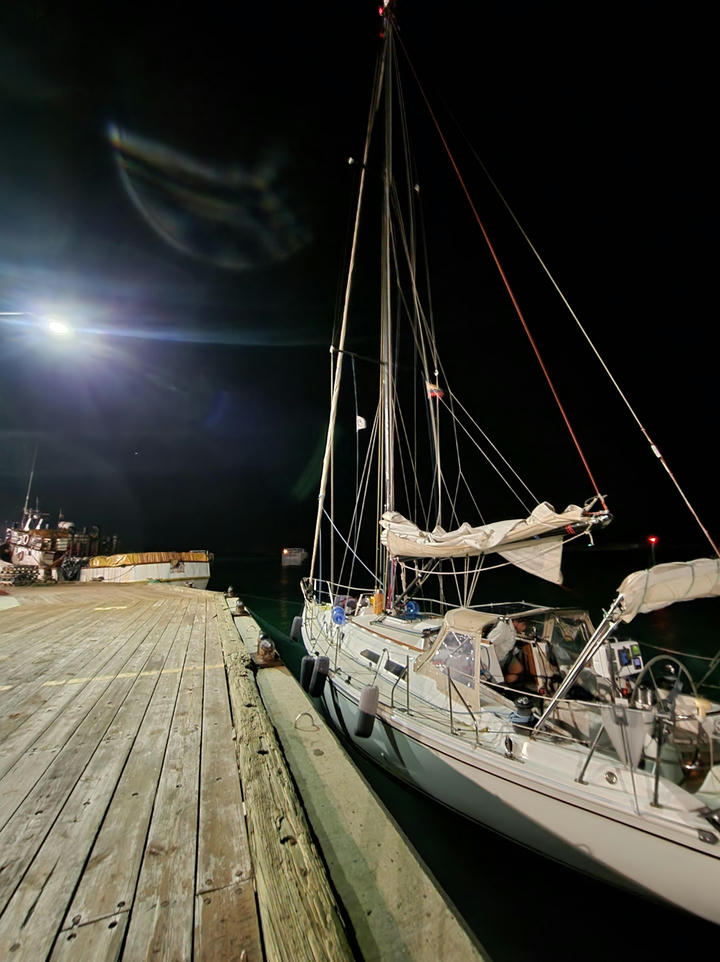
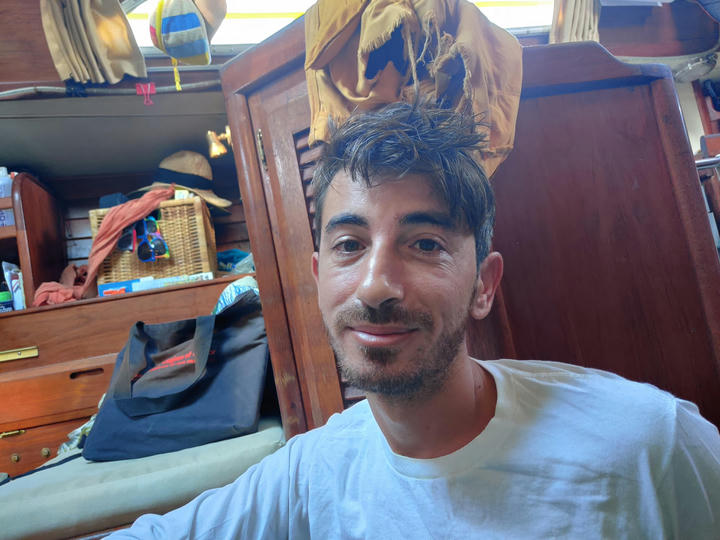
At 8:00 AM, we are woken up by a port official telling us we need to proceed with the check in. Right. We'll get ready. Yalçın, the official captain thanks to our Cartagena agent mistake (we alternate at every port usually), dresses up and goes to the immigration, with both our passports of course, but also both our phones in the hope of getting some internet for weather and family WhatsApp. The check-in process goes smoothly and is free this time (yay!). In the meantime, I start tidying up the boat: doing the dishes, putting various things to dry around. Shortly after Yalçın comes back, three customs agents come for an inspection. They ask about alcohol and firearms, then one of them goes on board for a short visit and that's it, we are officially in Aruba and made it to the ABC islands from Cartagena! It may take us a few days to lick our wounds and recover, not to mention to deal with this approaching depression (by maybe going a little further to Curaçao), but for now we are checked in and can finally go anchor somewhere calm.
